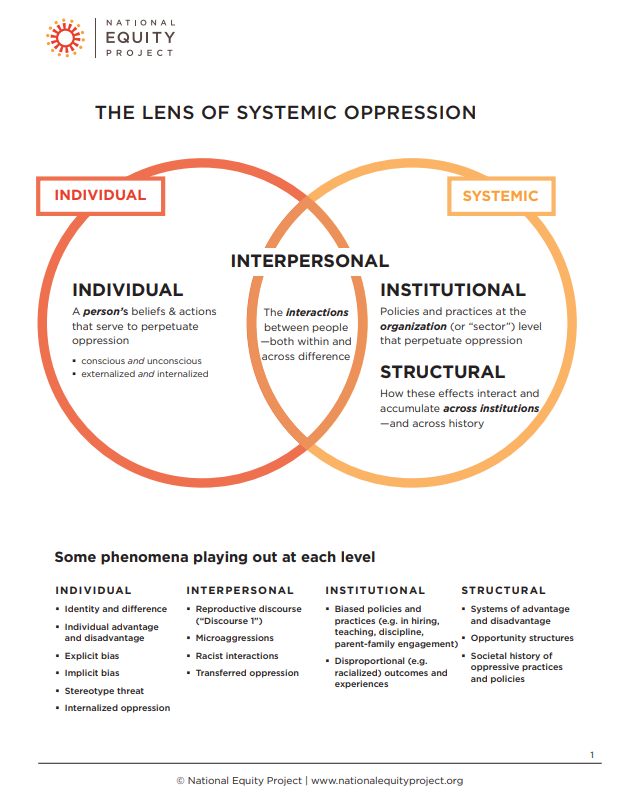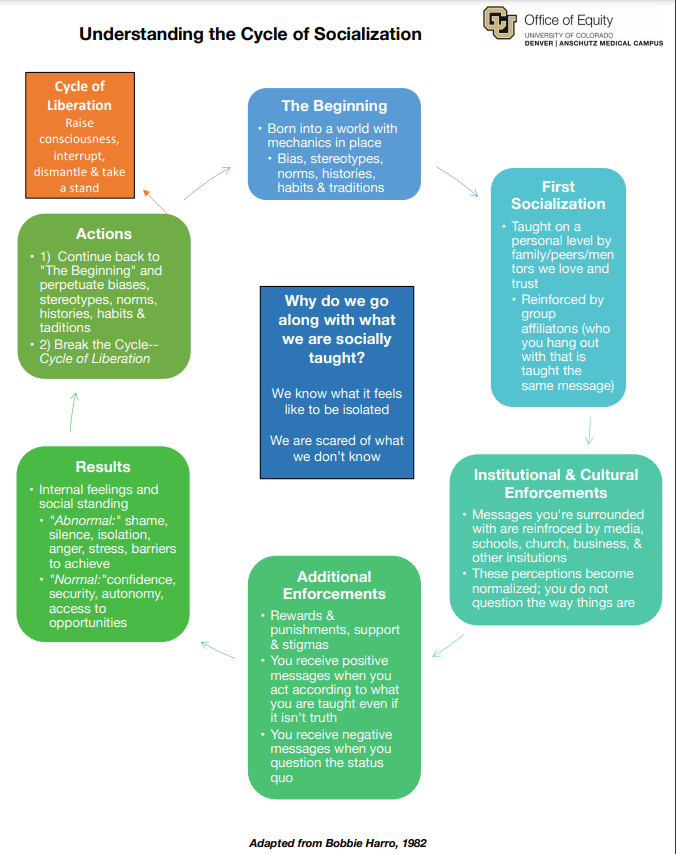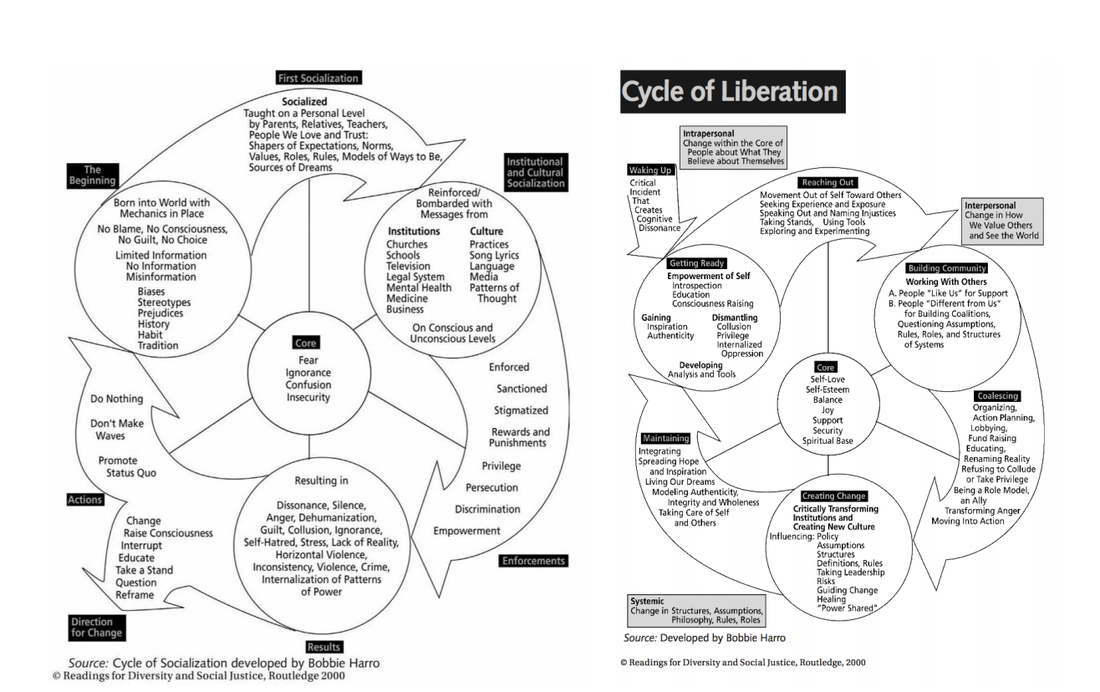Module 1: Socialization & Identity
Part 2: Socialization in the formation of identity
Identities form over time based on experiences - our socialization. The first section will explore the background of socialization and the cycle of socialization. If we want to understand our identities, how these identities have formed, and how all of this fits within society and systemic racism, then we need to have some idea about the process.
You can access information and learning opportunities in the document included below.
Suggested goals:
1. To gain an understanding of socialization and cycles of socialization.
2. To begin to connect socialization with the development of identity.
You can access information and learning opportunities in the document included below.
Suggested goals:
1. To gain an understanding of socialization and cycles of socialization.
2. To begin to connect socialization with the development of identity.
&1: Socialization
Identities form over time based on experiences - our socialization. The first section will explore the background of socialization and the cycle of socialization. If we want to understand our identities, how these identities have formed, and how all of this fits within society and systemic racism, then we need to have some idea about the process.
To begin, let’s dig into socialization. The first link below takes you to a lengthier text on the role of the social context on the social self. There are also links to videos that help to summarize socialization.
Read:
The Social Self: The Role of the Social Situation:
https://opentextbc.ca/socialpsychology/chapter/the-social-self-the-role-of-the-social-situation/
Watch:
Social Development: Crash Course Sociology #13:
https://www.youtube.com/watch?v=WbBm_YLwowc
To begin, let’s dig into socialization. The first link below takes you to a lengthier text on the role of the social context on the social self. There are also links to videos that help to summarize socialization.
Read:
The Social Self: The Role of the Social Situation:
https://opentextbc.ca/socialpsychology/chapter/the-social-self-the-role-of-the-social-situation/
Watch:
Social Development: Crash Course Sociology #13:
https://www.youtube.com/watch?v=WbBm_YLwowc
Socialization does not only occur through explicit teaching. Cues from society, whether within a circle of family and friends or the larger community, can influence how we view the world. For example, if an adult tells children in the car to lock the doors as they drive through certain neighborhoods, the children may be socialized to view these areas as dangerous. The same can be demonstrated when someone clutches their purse or moves to the other side of the street to avoid someone of a different race or ethnicity. Even unspoken actions carry meaning.
Reflect:
- Consider your own socialization. What are some characteristics or beliefs that have come from your family, friends, and/or significant people in your life?
- What events, actions, or beliefs have influenced your views of race and ethnicity?
- How has your socialization continued in your life?
There are layers of socialization that need to be considered in the development of identity. The National Equity Project overviews a “Lens of Systemic Oppression”, which includes individual identity. We will return to the idea of lenses of oppression and equity in Module 6, but, for now, consider the levels of socialization and identity in the following diagram:
Diagram from: https://www.nationalequityproject.org/frameworks/lens-of-systemic-oppression
Drawing on what we read and saw in the videos and the various levels presented in the “Lens of Systemic Oppression” diagram, we can begin to see the cycle of socialization. This cycle is summarized in the diagram from the University of Colorado:
Drawing on what we read and saw in the videos and the various levels presented in the “Lens of Systemic Oppression” diagram, we can begin to see the cycle of socialization. This cycle is summarized in the diagram from the University of Colorado:
Diagram from: https://www1.ucdenver.edu/docs/librariesprovider102/default-document-library/understanding-the-cycle-of-socialization-(1).pdf?sfvrsn=addb3ab9_2
The cycle of socialization can be contrasted with the cycle of liberation as presented in this diagram from the University of Wisconsin:
The cycle of socialization can be contrasted with the cycle of liberation as presented in this diagram from the University of Wisconsin:
Diagram from: https://diversity.wisc.edu/wp-content/uploads/2019/11/Cycles-of-socialization-and-liberation.pdf
Simply Psychology can help us bridge the ideas of socialization with identity. As Saul McLeod writes, social identity can often be associated with group membership and whether we are “in” or “out” of a group. As we prepare to learn more about identity, read the following article and reflect on the information from this module.
Read:
Social Identity Theory:
https://www.simplypsychology.org/social-identity-theory.html
Reflect:
In the “Considering Your Identity” module, you will have the opportunity to consider your identity, the groups to which you belong, and how these group memberships (or lack of group memberships) impact your identity.
Reflect:
The next part will help to explore your identity.
Simply Psychology can help us bridge the ideas of socialization with identity. As Saul McLeod writes, social identity can often be associated with group membership and whether we are “in” or “out” of a group. As we prepare to learn more about identity, read the following article and reflect on the information from this module.
Read:
Social Identity Theory:
https://www.simplypsychology.org/social-identity-theory.html
Reflect:
- Can you apply the cycle of socialization to your life? How does the cycle impact your socialization or identity?
- When considering your social identity, what are your “in groups” and what are your “out groups”?
- What qualities grant you the status of “in” or “out” of a particular group? How does group membership relate to the cycle of socialization?
In the “Considering Your Identity” module, you will have the opportunity to consider your identity, the groups to which you belong, and how these group memberships (or lack of group memberships) impact your identity.
Reflect:
- What is your understanding of socialization and cycles of socialization?
- How would you begin to connect socialization with the development of identity?
The next part will help to explore your identity.




